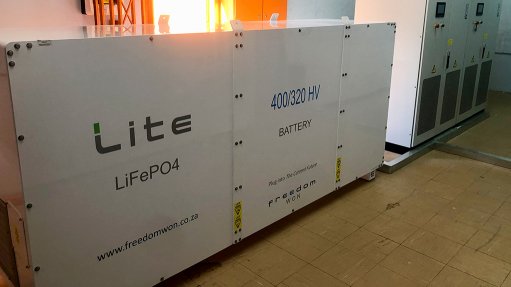SA Property Growth Remains Stagnant But Commercial Sector Offers Pockets Of Growth
This article has been supplied as a media statement and is not written by Creamer Media. It may be available only for a limited time on this website.
Nearly a decade since the bottom fell out of the property market, the global financial crisis of 2008 continues to cast its long shadow in South Africa. The gloom is made worse by yet more shadows cast by recent economic setbacks – most recent being South Africa’s GDP growth forecast being revised to 0% in 2016.
This is according to Gerrie van Biljon, executive director at Business Partners Limited (BUSINESS/PARTNERS), who says that the local property market is not independent of the overall economy and how it performs. “Rising inflation, a weak currency, doubts over the stewardship of the economy and the threat of a downgrade, among other factors, means that property values remain low for those who have it, and unaffordable for those who want to acquire it.”
However, a closer look at the different sub-sectors of the property market reveals a more nuanced picture which is far from uniformly sombre. “The worst performer is the residential property sector, which has delivered low or negative real returns since 2007. But commercial and industrial properties have managed to hold their own, even showing pockets of exceptional growth.
“There are even signs that office space, which suffered an oversupply in the early years after the financial crisis, may start returning value,” says van Biljon.
He points to the results of a recently released market size estimation by the Property Sector Charter Council, which reveal that for the 2014/15 fiscal year, commercial property carried a value of around R1.3trn, up from some R780bn. Of this, almost R790bn is held by corporates, R300bn by real estate investment trusts (REITs), R130bn by unlisted funds, and R50bn by life and pension funds. Retail property has the highest value at R534bn (R340bn in 2012) followed by office properties at R357bn and industrial properties at R281bn. Hotels and other property accounted for R94bn in value. The report shows that the overall size of the South African property market sits at R5.3trn, up from a reported R4.9trn in 2010.
Van Biljon reckons that the relative strength of commercial and industrial properties is not because retail and manufacturing are booming, but rather because returns on other asset classes are so trivial that investors are chasing whatever value they can get. “The flip side of this dynamic is that the owners of commercial and industrial properties are holding onto their assets and, as a result, even though shop and factory buildings are growing in value, there are very few of them on the market.
“Under these circumstances, property investors seem to be sticking to a holding pattern, not expanding their portfolios but managing them carefully so as to avoid risks and losses,” adds van Biljon.
Occasionally, the more adventurous developer will surprise the market with a development reminiscent of the pre-crisis days, except that it captures much more attention in today’s climate for being unusual. “For example, the Atterbury Property Group opened the Mall of Africa in Midrand this year, which at 131 000 square metres is South Africa’s biggest single-phase shopping mall development.”
But van Biljon believes that this by no means heralds a return to the shopping-centre craze that drove an explosion of retail space before the financial crisis. “Commercial developments follow economic and population growth. For now, we can expect a levelling off of the growth of retail space.”
An interesting property sector that almost certainly will show strong growth in the foreseeable future is student accommodation, says van Biljon. “Figures show that South Africa has 550 000 students who need accommodation, and the state, in the form of the universities and colleges, can only provide rooms for about 100 000 of them. The rest will have to be provided by flats, spare rooms and of course property developers taking up this opportunity.”
None of the gloom hanging over the property market means that it has lost its value as a long-term investment, adds van Biljon. “It is just that there are hardly opportunities available for a quick profit in the short run”.
For those considering property investment, affordability is the main consideration says van Biljon. “Instalments are generally higher than rentals, at least in the first five years, a reality which poses a cash-flow challenge for a business that decides to become its own landlord.
“Rentals, however, are subject to annual escalations, so in later years mortgage instalments will become more affordable than the rentals the business would have paid, but only if the rise of interest rates is contained.
“Individual investors should therefore not expect immediate returns on their investment in a property. For now, long-term capital growth should be the goal, as well as any strategic consideration, such as securing the position of a business by buying the building from which it operates,” concludes van Biljon.
Comments
Press Office
Announcements
What's On
Subscribe to improve your user experience...
Option 1 (equivalent of R125 a month):
Receive a weekly copy of Creamer Media's Engineering News & Mining Weekly magazine
(print copy for those in South Africa and e-magazine for those outside of South Africa)
Receive daily email newsletters
Access to full search results
Access archive of magazine back copies
Access to Projects in Progress
Access to ONE Research Report of your choice in PDF format
Option 2 (equivalent of R375 a month):
All benefits from Option 1
PLUS
Access to Creamer Media's Research Channel Africa for ALL Research Reports, in PDF format, on various industrial and mining sectors
including Electricity; Water; Energy Transition; Hydrogen; Roads, Rail and Ports; Coal; Gold; Platinum; Battery Metals; etc.
Already a subscriber?
Forgotten your password?
Receive weekly copy of Creamer Media's Engineering News & Mining Weekly magazine (print copy for those in South Africa and e-magazine for those outside of South Africa)
➕
Recieve daily email newsletters
➕
Access to full search results
➕
Access archive of magazine back copies
➕
Access to Projects in Progress
➕
Access to ONE Research Report of your choice in PDF format
RESEARCH CHANNEL AFRICA
R4500 (equivalent of R375 a month)
SUBSCRIBEAll benefits from Option 1
➕
Access to Creamer Media's Research Channel Africa for ALL Research Reports on various industrial and mining sectors, in PDF format, including on:
Electricity
➕
Water
➕
Energy Transition
➕
Hydrogen
➕
Roads, Rail and Ports
➕
Coal
➕
Gold
➕
Platinum
➕
Battery Metals
➕
etc.
Receive all benefits from Option 1 or Option 2 delivered to numerous people at your company
➕
Multiple User names and Passwords for simultaneous log-ins
➕
Intranet integration access to all in your organisation


















